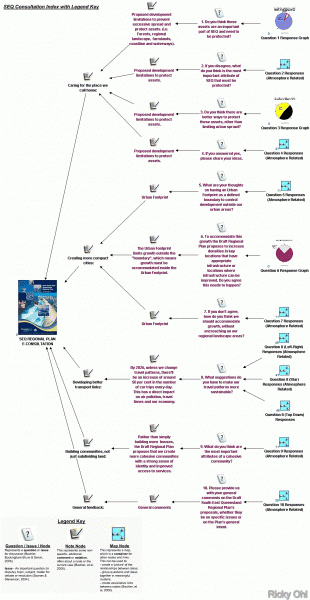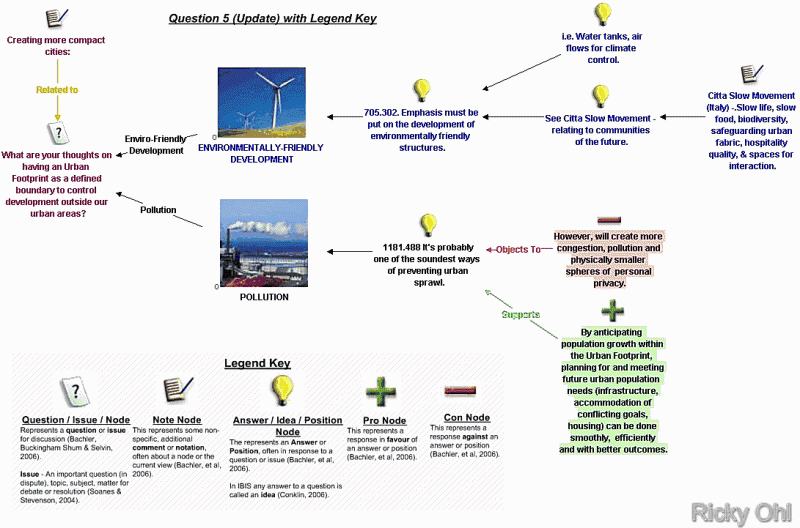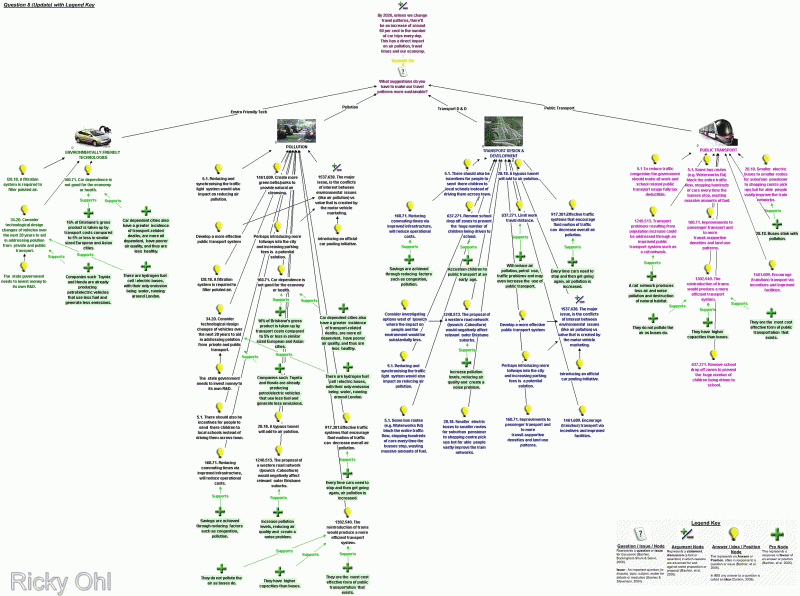
News
About Compendium
Associated Institutions
Acknowledgements
|
 |
|
| Latest |
 |
Archives |
 |
 |
 |

The Index page to the Consultation Maps |
 |
 |

Responses to a question on controlling urban sprawl |
 |
 |

Thematically clustered feedback on sustainable travel |
 |
Compendium used to map Queensland public consultation
Ricky Ohl
29.01.07
Compendium has been used to map environmental atmosphere related content elicited from >8000 public responses to the S.E. Queensland Regional Plan, demonstrating how argument mapping helps deliver the transparency and accountability required in such Consultative Democracy. These results come from a project at Griffith University led by Ricky Ohl, who has been developing theory and practice for the use of argument visualisation in e-democracy.
CONTEXT: In 2004-2005 the Queensland State Government released a draft Regional Plan for South East Queensland (SEQ) and invited the SEQ public to submit comments, concerns, and questions on any issues in relation to the draft SEQ Regional Plan. The public participated in an online forum, multiple offline forums and communicated in writing both digitally and in hardcopy form. 8460 formal written submissions were received via the ConsultQld online forum, email, post, and fax.
CONSULTATIVE DEMOCRACY AS A WICKED PROBLEM: Horst Rittel and Melvin Weber, who wrote the landmark article "Dilemmas in a General Theory of Planning" and coined the term 'Wicked Problem', considered public policy making and urban design to be a typical example of a wicked problem. What's more, the SEQ Regional Plan consultation -- because of its large land coverage -- includes urban, sub-urban and rural planning, which adds to the complexity. SEQ has a unique identity (i.e. natural & social factors) but is also fraught will issues that have international generalities and relevance. So this case has inherent interest because of its significance concerning consultative democracy (Queensland is regarded as a world leader) and it is representative of a significant wicked problem that has international commonalities.
Consultative Democracy for regional planning falls into the category of a ‘Wicked Problem’ due to the many disparate voices, viewpoints and agendas involved in such forums. The OECD proposes that “wicked problems require deliberative discussion where consensus arises through debate with alternative options and competing interests being exposed”. In such a fragmented, pluralistic forum it is a difficult task for “representatives to make sense of the myriad of voices”, and the desire for transparency places a greater onus on intermediaries to summarise contributions and represent the logic contributing to government decisions.
CONSULTATION MAPPING: Since Computer-Supported Argument Visualisation tools have been used to enhance information extraction, support analyst’s cognition and demonstrate transparency in decision-making in wicked problems, this research project has investigated these benefits for what I call "Consultation Mapping".
There are various argumentation schemes that can be mapped diagrammatically and modelled formally for computational analysis, but their focus is often on mapping legal, philosophical and scientific arguments which are typically more rigidly structured than public consultations around wicked problems. At the other end of the spectrum are free form schemes such as SODA, which do not provide any argument notation. Compendium a derivative of Horst Rittel's Issue Based Information System (IBIS) which was developed to aid in dealing with urban planning, wicked problems is a powerful, fast developing and well supported software. The IBIS related notation in Compendium (i.e. issues, questions, arguments) can help establish common ground within diversity, understand positions, surface assumptions and collectively construct consensus.
RESULTS: This project demonstrates the role that Computer-Supported Argument Visualisation tools like Compendium can play in consultative democracy. Specifically, this kind of mapping can show that all relevant issues (public submissions) have been heard and considered (transparency). Accordingly, in Regional Planning, “Consultation Mapping” has a distinct quality with elements of debate, dialogue, argument, concept and mind level mapping, plus policy-making logic visualisation. The large potential population of public consultations dictate that a unique form of mapping approach and compendium map design is required.
This work comes from my PhD research at Griffith University, Queensland, Australia, entitled “Computer Supported Argument Models and Visualisation for Wicked Problems.”
Related Links:
« previous story | next story »
|
|
|
